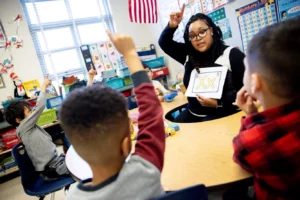 by Nancy Almasi
by Nancy Almasi
Abby Zwerner, the Newport News teacher shot by a 6-year-old student a year ago, doubts she will ever return to teaching. In addition to her lingering injuries and psychological trauma, Zwerner is suing the Newport News School District for ignoring multiple warnings that the student had a gun and was prone to violence. The local school board tried to block the suit from going forward, arguing that the teacher was only entitled to worker’s compensation. A judge disagreed, and the suit is moving forward.
While this is an extreme example, teachers across the Commonwealth and the country have been quitting in droves. Sadly, the lingering effects from the pandemic have only made matters worse. USA Today reported that teachers have joined the “Great Resignation,” as student behavior has become their number-one complaint.
One former teacher noted that emotional outbursts from students have become commonplace. She also noted that she was forced to cover for other teachers due to staff shortages — limiting her ability to connect with her students and eating into her planning time. She ended up quitting in the middle of the school year – a catastrophe for her students and fellow teachers. “It got so bad,” she said, ‘’I was very overwhelmed and stressed. I was anxious and tired all the time.”
In an attempt to understand why public school teachers are leaving at such high rates in Virginia, the Joint Legislative Audit and Review Commission, in a 2023 report, interviewed fully licensed teachers in the Commonwealth who are not currently working in Virginia public schools. Forty-six percent of those surveyed left the teaching profession for personal reasons and fifteen percent retired. Of the remaining forty-six percent who left because they were unhappy being a teacher, seventy-five percent cited a lack of backup from school leaders; seventy percent cited heavy workload; and sixty-four percent cited ineffective school leadership. Surprisingly, salary, at just fifty-five percent, was the least-mentioned reason for no longer teaching.
So, if salary is the lowest-ranking problem cited, then increased pay is probably not the solution! Governor Youngkin already increased teacher pay twelve percent over the last two years, yet the General Assembly is proposing even greater increases in the next two-year budget cycle. There is even a bill to guarantee that Virginia public teachers always make above the national average. Increasing the pay of frustrated public school teachers, without addressing their main frustrations, will just lead to higher paid teachers leaving the profession at similar rates. So, what is the answer?
In Virginia, public schools have 40,000 fewer students than expected based on pre-pandemic trends as students are flooding into alternative schooling options. Whether it’s charter schools, religious schools, private schools, homeschooling, learning centers, or micro-schools, these models have been thriving since the pandemic! It turns out that this growing list of educational options outside of public schools is not just popular with parents for their children, but also with teachers.
Forbes magazine recently teamed up with polling firm Morning Consult to ask public, private, and charter school teachers about their career well-being. One of the questions asked was whether or not they would recommend teaching as a career to a friend or family member. Forty-one percent of those surveyed said no, while thirty-six percent said yes. When drilling down, the responses from teachers in private and charter schools were far more positive than teachers in traditional public schools, despite public school teachers being paid more.
It’s time to start looking at what’s working in the alternatives to public education. Better yet, legislators should consider allowing these alternative options to compete with monopoly public schools for students and teachers. As public school test scores decline, student truancy rises and teachers continue to quit – time is running out. It is probably too late for Abby Zwerner, who misses teaching and misses her students but is unlikely to return. She, like most teachers, sees education as a calling, not a profession. But the current school environment drove her away and is keeping her and many others away. In a profession desperate for talented educators, it is a shame to have someone’s enthusiasm for their profession diminished. School choice, not more money, is the better answer.
Governor Youngkin and the General Assembly should put aside their political differences and find a way to spend the added money they are proposing for increased teacher pay, and explore means of giving teachers greater options in the types of educational environments in which they teach.
Nancy Almasi is a Researcher at the Thomas Jefferson Institute for Public Policy. She may be reached at Nancy@thomasjeffersoninst.org. This column was first published in the Institute’s Jefferson Journal.

Leave a Reply
You must be logged in to post a comment.